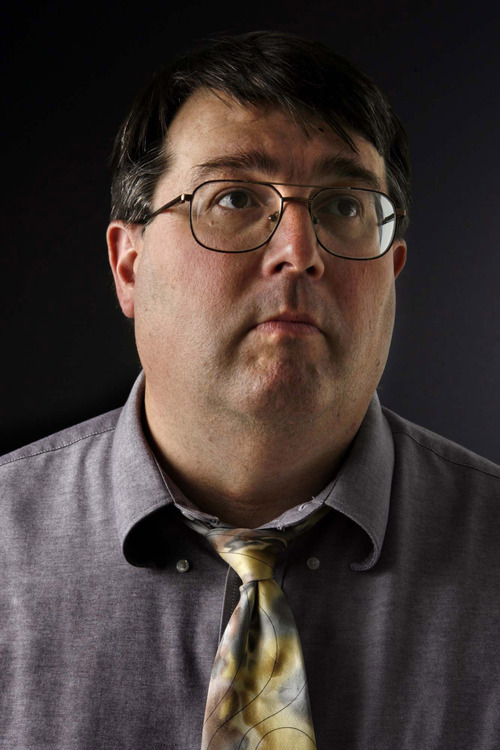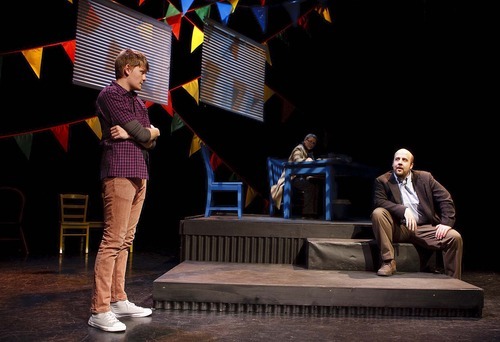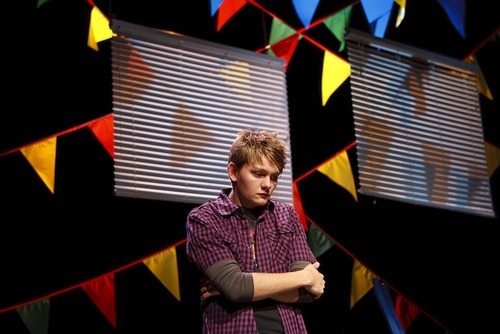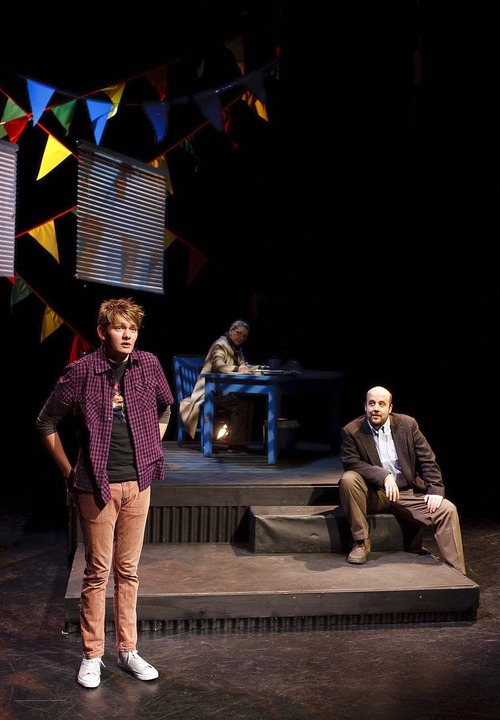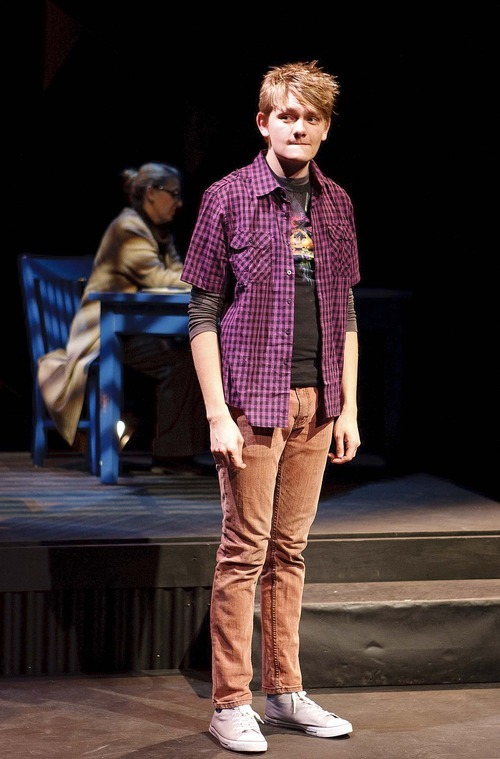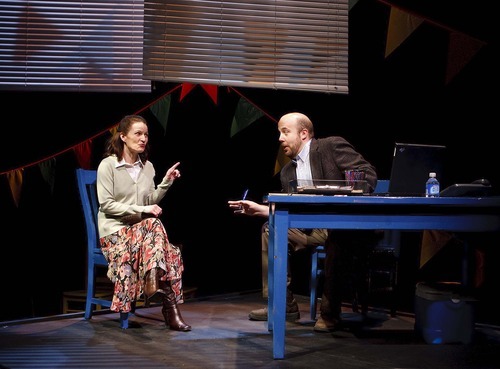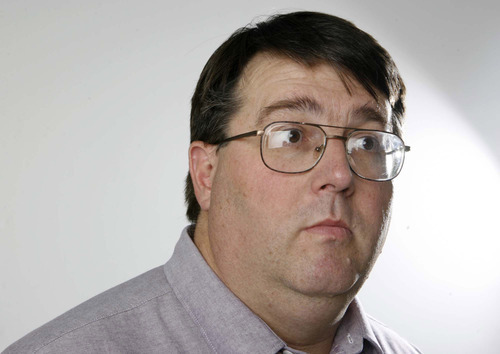This is an archived article that was published on sltrib.com in 2011, and information in the article may be outdated. It is provided only for personal research purposes and may not be reprinted.
Utah playwright Eric Samuelsen played with time, place and dramatic style in previous scripts of his plays "Miasma" and "Amerigo" produced by Plan-B Theatre Company.
For "Borderlands," his new play about to receive its world premiere March 31, Samuelsen returns to the more Aristotelian conventions of dramatic writing. And the play is set in — of all places — a used-car lot.
"I really enjoy buying used cars," said the playwright and Brigham Young University theater professor during an interview in the lobby of Rose Wagner Performing Arts Center. "It's the one place in American commercial life that's contingent. We can buy a gallon of milk at the grocery store and know exactly what we're getting, and at what price. Used cars are one of the most interesting transactions left to us."
And, of course, they make a rich dramatic metaphor. The contingent space of the used-car lot, the transaction of purchasing a used car and even the simple act of holding a conversation while sitting inside a vehicle form the dramatic and poetic parameters of "Borderlands."
—
Artistic truth, local borders • It's a work Plan-B Theatre producing director Jerry Rapier, director of this premiere, calls Samuelsen's most personal work to date. And its characters might be immediately recognizable to anyone who has lived in, or even knows about, Utah.
Dave McGregor, played by Kirt Bateman, is a used-car salesman with a rocky past that puts him in dubious standing with The Church of Jesus Christ of Latter-day Saints, even as he clings to his Mormon identity. Dave's sister Phyllis Wells, played by Teri Cowan, is the proud LDS owner of the Provo used-car lot on which Dave spies looming customers.
Gail Lewis, played by Stephanie Howell, is a customer intrigued by Dave's seeming personal contradictions. Despite his off-kilter advances, she keeps coming back to the lot to converse with him in "the honesty car," a space that allows her to vent doubts about faith and life.
The wrench in the works, and the play's most honest character throughout, is Brian Roenicke. Played by Topher Rasmussen, he's sent to his aunt Gail in Provo by his parents from South Carolina to sort out his sexual identity in the high-mountain bosom of Mormondom.
The play's dialogue first approaches its themes at an angle, as Dave and Gail trade stories of how they hit various banks on the road of life. Dave, having hit bottom, finds social niceties trite compared with the chance to tell people the truth, even if it means spoiling a sale.
When Gail confides in him doubts about her son's imminent LDS mission and her faith in the church, he admonishes her to be honest with her family. If only she could. Maintaining the path of least resistance, while keeping up appearances, has become Gail's great talent.
—
Friends with agendas • The difference between Mormons and non-Mormons is that "non-Mormons have friends with benefits," Gail tells Dave; "what we have are friends with agendas."
When push comes to shove between Brian and Phyllis, "Borderlands" erupts in a heart-rending scene in which all four of Samuelsen's characters find a moment of grace and expiation. Suddenly, honesty between people doesn't seem so hard, even if it still requires immense amounts of courage.
One aim of his play was to recontextualize the word "coming out" so that it went beyond its current meaning in the gay community to encompass a whole range of truth-telling in human interaction, Samuelsen said.
He spent more than three years' time, here and there, working on "Borderlands." The task was compounded by his polymyositis, a chronic degeneration of the muscles diagnosed two years ago. The condition leaves his joints open to dislocation while typing and put him in the hospital one year ago, when Plan-B produced his play "Amerigo."
"With this [play], I was afraid to get as deeply into the characters as I needed to," Samuelsen said. "I'm more Gail than Dave. I'm the kind of person who wants to be well-liked and known."
—
Crafting onstage stillness • Scenes of the two sitting awkwardly in a used car to talk fit Samuelsen's aim of finding a way to equate physical discomfort with the spiritual discomfort of hard truths. For an actor, it means the subtext of the words becomes distilled and concentrated.
"Stillness is really hard onstage to do," Bateman said. "You think you're just going to sit there and talk, but then you have to focus even more on what lies behind the words."
Rehearsal breaks for the cast have been full of conversation, revolving around questions none of the actors had thought about before reading the play. What does it mean to come from a Mormon family when you're no longer Mormon? What are the idiosyncrasies of growing up non-LDS in an LDS community? How far can people be pushed in moments of desperation?
"Usually actors on break talk about anything but the play," said Bateman. "It's surprising how deep our conversations have gotten."
—
Coming out about Sarah Palin • Samuelsen isn't trying to make a religious statement in the play. "I'm not saying a lifetime in the church stifles spirituality," he said. "Borderlands" instead reflects his fascination with the nature and effects of honesty, a theme also central to one of his favorite playwrights, Henrik Ibsen.
"I had to come out to my son and admit to him that I like aspects of Sarah Palin," Samuelsen said. "She would be a disaster as president, but when Palin says something, you believe her. I have the most appalling addictions to the worst aspects of American culture."
Bateman said the play is one of the most spiritual he's ever acted in and that the final message of "Borderlands" is deeply Christian.
"What [Samuelsen] is saying, in a way, is that miracles are possible — and available to anyone who calls on them," Bateman said.
Plan-B Theatre's 'Borderlands'
A world-premiere production of Utah playwright Eric Samuelsen's play, set in a used-car lot, exploring the faith of Mormons who are "coming out" in expressing spiritual doubt.
When • March 31-April 10; Thursday-Friday, 8 p.m.; Saturday, 4 and 8 p.m.; Sunday, 2 p.m.
Where • Rose Wagner Performing Arts Center's Studio Theatre, 138 W. 300 South, Salt Lake City
Info• $10-$20, at 801-355-ARTS or planbtheatre.org


